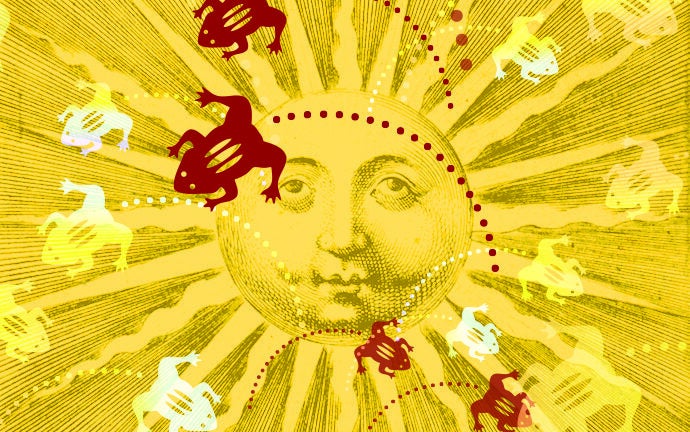
The perks and trials of having a birthday every four years
Most people probably know that this is a leap year, but did you know that leap day doesn’t occur quite every four years?
When a year is divisible by 100, but not by 400, leap day is skipped. For instance, there was no leap day in 1900, and there will not be one in 2100.
It takes about 365.25 days for the Earth to orbit the sun.
“So, if a leap day isn’t added every four years, the calendar year would drift away from the solar year, and after enough time, summer in the northern hemisphere would be in January,” explained Douglas LaRowe, assistant professor (research) of Earth sciences, who happens to have been born on Feb. 29.
As is often the case, however, nature isn’t quite so mathematically convenient. Each solar year is actually closer to 365.2425 days long, so it’s not quite correct to add a day every four years; the calendar must leap a leap year every so often.
“The way to take care of this ‘not-quite-every-four-years’ problem is to add a leap day every four years and to skip a leap day three times every 400 years,” LaRowe said.
Lively anecdotes
There’s a certain novelty associated with being a “leap-day baby,” and some USC Dornsife faculty and alumni who share this rare birthday celebrate it accordingly.
Alumna Angela Oh relishes the infrequent opportunity to have a “real” birthday.
“This year* I’m heading to Orlando, Florida, to celebrate my ‘sixth birthday’ with Mickey Mouse and friends at Walt Disney World,” said Oh, who earned her bachelor’s degree in neuroscience in 2014. “I spent my ‘other sixth birthday’ 20 years ago at Disneyland, so it seemed appropriate.”
While Oh loves celebrating her actual birthdays, she is also grateful for friends at USC who made ‘fake birthdays’ special while she was a student.
“During my freshman year, my friends threw me what they called my ‘birthday minute,’” she said.
During the last 30 seconds of Feb. 28 and the first 30 seconds of March 1, they held a surprise party. “During my ‘birthday minute,’ we sang ‘Happy Birthday,’ ate cake and opened presents,” she recalled.
Ralph “Skip” Balfour, who earned a Bachelor of Arts in political sciences in 1965 and a law degree from USC Gould School of Law in 1968, has similarly fond memories.
“I often receive gifts appropriate for my number of birthdays,” he said. “A water blaster when I turned ‘10’ [40] was a favorite.” He also got a surprise Bar Mitzvah for his 13th/52nd birthday.
In fact, Balfour’s mother often said that while she was in labor, the nurses told her she had to wait until March 1 to deliver him.
“She said that was not going to happen,” Balfour said. “I often thought that my nickname, ‘Skip’ — which she gave me at birth — was related to the skipping of birthdays.”
He added that a nice benefit of the unique birthday is that he often gets calls on Feb. 29 from friends with whom he doesn’t often speak.
“They open their calendars, see its Feb. 29 and think about the one person they know that was born on that day,” he said.
Absurdist struggles
The perks of having a rare birthday may be obvious, but there are some subtle drawbacks.

Earth sciences professor Douglas LaRowe has a rare leap-year birthday. Photo courtesy of Douglas LaRowe.
“One time, I was trying to fill in a registration form for a scientific organization, and they required a birthdate to complete it,” LaRowe said. “The only options were to use drop-down menus, and there was no option for Feb. 29.”
LaRowe wrote to the organization to let them know he couldn’t complete the registration because he couldn’t add a proper birthdate into the system.
“You would think that the largest geo-scientific organization on the planet would know something about the duration of a year and the peculiar nature of the modern calendar,” he said, tongue firmly planted in cheek.
LaRowe, also somewhat facetiously, resents that his driver’s license always expires on Feb. 28, giving him one fewer day every 10 years to renew it.
Novelty prevails
Despite the mock-aggravation LaRowe feels about the not-so-obtrusive problems that come with having a leap-day birthday, he is excited to celebrate his “big 10/40” this year.*
“I plan to do it over a four-day span,” he said, “not necessarily to make up for past years, but to take advantage of having a real birthday.”
And for Balfour, the greatest gift came in explaining his odd birthday to his 6-year-old grandson.
“When I told him I was born on leap year, and that I only had real birthdays every four years, without hesitation my grandson said, ‘Papa, you should get four presents.’”
Though LaRowe knows even leap babies aren’t exempt from the passage of time, he sometimes feels as if having fewer birthdays has provided a fountain of youth.
“I’m often mistaken for an undergraduate and teased about it by friends and my wife,” he said. “Having this birthday does make me feel younger, and it gives me permission to act my age — whatever I feel like it is that day.”
*This story was originally published in 2016. We wish Associate Professor LaRowe a happy 11th/44th this year, Ms. Oh a happy “seventh” and Mr. Balfour a happy 19th/76th. – Ed. (Feb. 28, 2020)